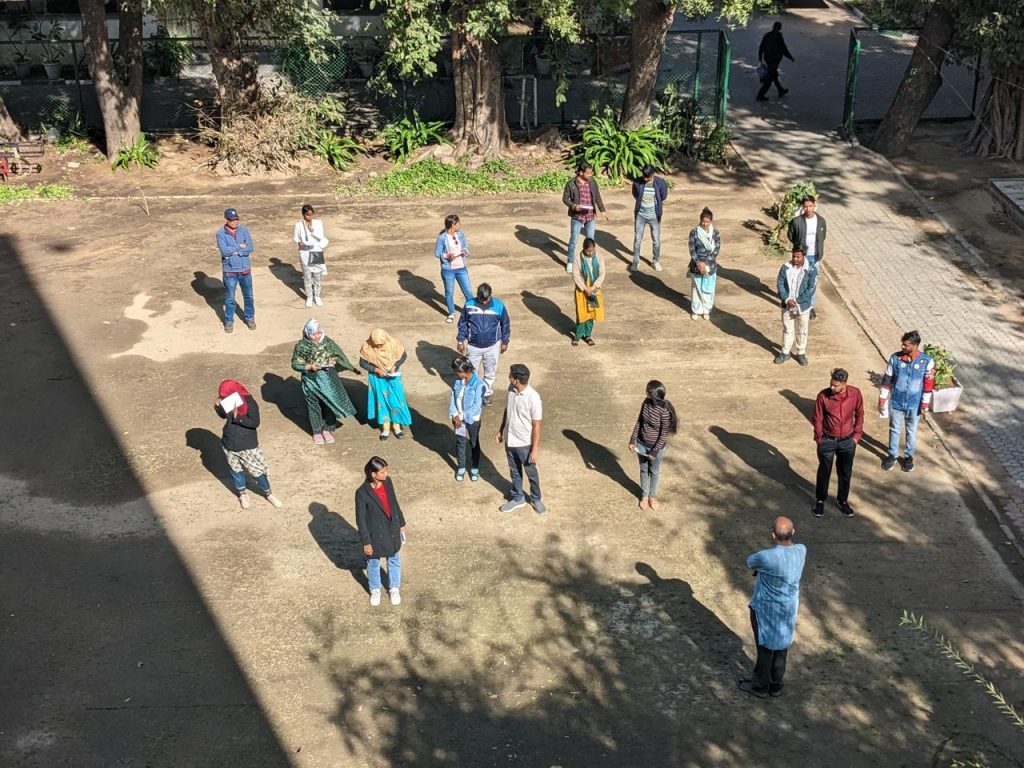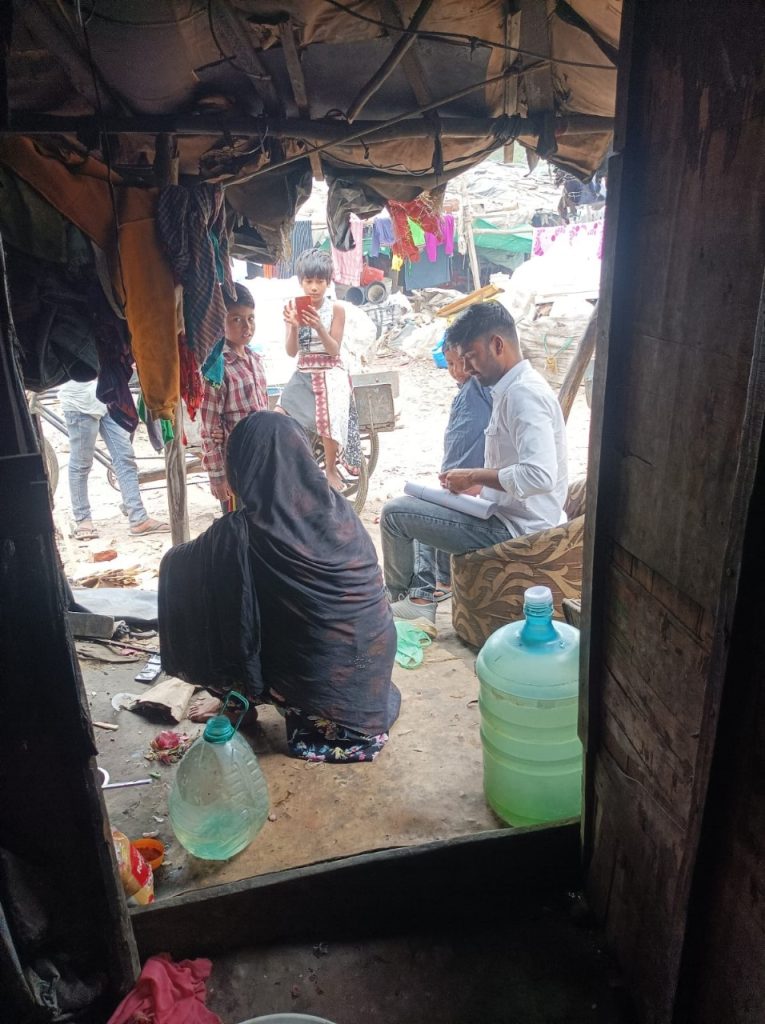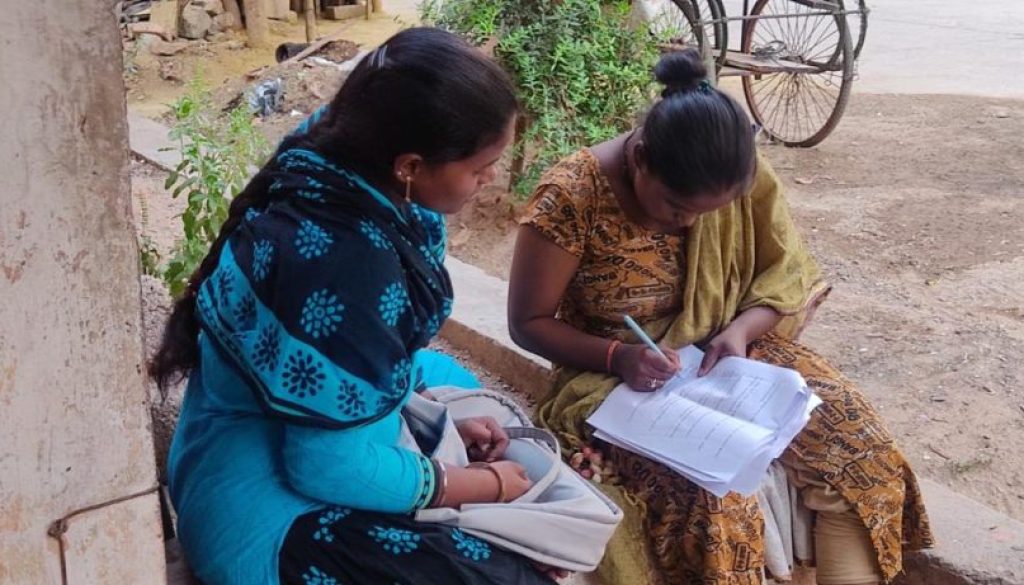IMPACT STORY: Collaborative generation of data on the health and wellbeing of waste workers in India
Authors: The George Institute for Global Health, India (TGI), with the ARISE Consortium
As part of ARISE, researchers from The George Institute (TGI), India worked with local partners and waste worker communities in Delhi and Andhra Pradesh to develop a survey to gather quantitative data on the health and wellbeing (H&WB) of waste workers. This census-style survey with 10,000 adult waste workers resulted in an increased understanding of the dynamics of waste worker communities, and a new source of data that community members can draw upon to influence policy and advocate for targeted interventions that address their unique challenges and aspirations.
Background
An estimated 1.5 million people are engaged in waste work in India, and yet, there has been no large-scale data driven study or evidence around the H&WB of waste workers on a national or state scale. However, many governance actors tend to demand quantifiable data for decision-making when waste workers approach them for interventions and/or grievance redressal.
Through ARISE, the research team at TGI identified the global and local gaps in the data pertaining to waste workers, and this was confirmed by local partner organisations and waste workers living in Delhi and Andhra Pradesh.
Waste workers in these informal settlements highlighted the importance of having data on their own health and wellbeing, and they wanted to have the numbers and statistics ready so that they could, “Speak the language of the governance actors in their conversations and negotiations with the governance actors.”
To help address this lack of data, between 2021 and 2022 the ARISE team began work with partner organisations and community members to create a simple survey questionnaire and develop the appropriate data collection methods to collect quantitative data around the H&WB of respondents in Delhi and Andhra Pradesh.
Starting in February 2023, researchers held regular training and reflection sessions with enumerators. Using a participatory action research (PAR) approach, these sessions aimed to ensure that enumerators understood how to conduct surveys with marginalised communities and to be respectful and sensitive to waste workers when conducting the surveys.
Between March and July 2023, preliminary data collection took place across eleven districts of Delhi and Andhra Pradesh. During the regular reflection sessions, the survey tool was continually refined to incorporate feedback from enumerators during the first phase of the survey.

For improved survey results, Enumerators were trained on social determinants of health using participatory research methods and regular presentations. The figure above depicts one such training sessions with enumerators using the “Power Walk” method.
Impact
The H&WB survey resulted in a set of comprehensive data from a diverse sample of 10,000 waste workers (4,200 women and 5,800 men), which has improved understanding of the dynamics of these waste worker communities who were otherwise not reflected in any national-level or state-level data.
The process of developing the survey and training enumerators from the waste worker community, as well as having access to precise evidence from the quantified data, has helped to empower community members and partner organisations and has strengthened their capabilities to influence policies and advocate for targeted interventions that address their unique challenges and aspirations.
On-going community action and advocacy with governance providers is taking place using the evidence gathered in the H&WB surveys. In Delhi, one of the enumerators told us about how the initial results from the survey have been used for action in their area:
“There are two primary concerns we have identified through the survey process: first is the need for Anganwadis (early childhood learning centres). For this we have also met the local Anganwadi Officer who will be visiting Bhalaswa Village (in Delhi). Through this, women and children will be able to avail health check-ups and nutritious meals, vaccinations and maternity scheme cards.
Second, is that we have demanded identity cards for waste picker friends in Yamuna Vihar in Delhi. Through this, waste pickers will be able to secure a space for waste segregation and pull-carts.”

The H&WBS was designed to illuminate the living and working conditions of informal waste workers. In the figure, a surveyor administers the survey outside the household premises of a waste working family
Lessons learned
For the H&WB survey process, we adopted a census-style approach, that included a broad range of data on, for example, demographics, education, occupational details, household assets, conditions and social participation, health status, menstrual health, water, sanitation, and hygiene (WASH), utilisation of health services, mental health, substance use, recreation, and perceptions of the social environment. This helped to ensure that diverse voices within communities were heard and represented.
The research team factored in contingencies such as periods of rain, extreme heat and/or heat waves, regional and religious in gauging access to communities. Timelines were adjusted according to these delays, and enumerators were given considerable flexibility to work without undue pressure.
For the research team, the H&WB survey has been an entry point into learning and working with quantitative data. The team has been working towards better data monitoring, cleaning and analysis in the process.
What next
Seeing the results of the H&WB surveys in these areas, other organisations and waste worker communities have expressed interest in replicating the survey in their own communities. For example, waste workers living in Shimla (one of our ARISE action sites) have reached out to TGI researchers to request a similar survey in their area.
The research team is finalising the H&WB survey report and planning ways to disseminate the findings with the community members and other stakeholders.
Acknowledgements
Thank you to Sweta Dash, Louise Clark, Kate Hawkins, Nazia Islam, Jiban Karki, Leah Murphy, Anthony Mwaniki, Hayley Stewart, Joe Taylor and Sia Tengbe for developing and editing this output.
Relevant resources:
Lakshmi J.K. et al. (2020) Planning the India health and well-being survey, ARISE Consortium,
